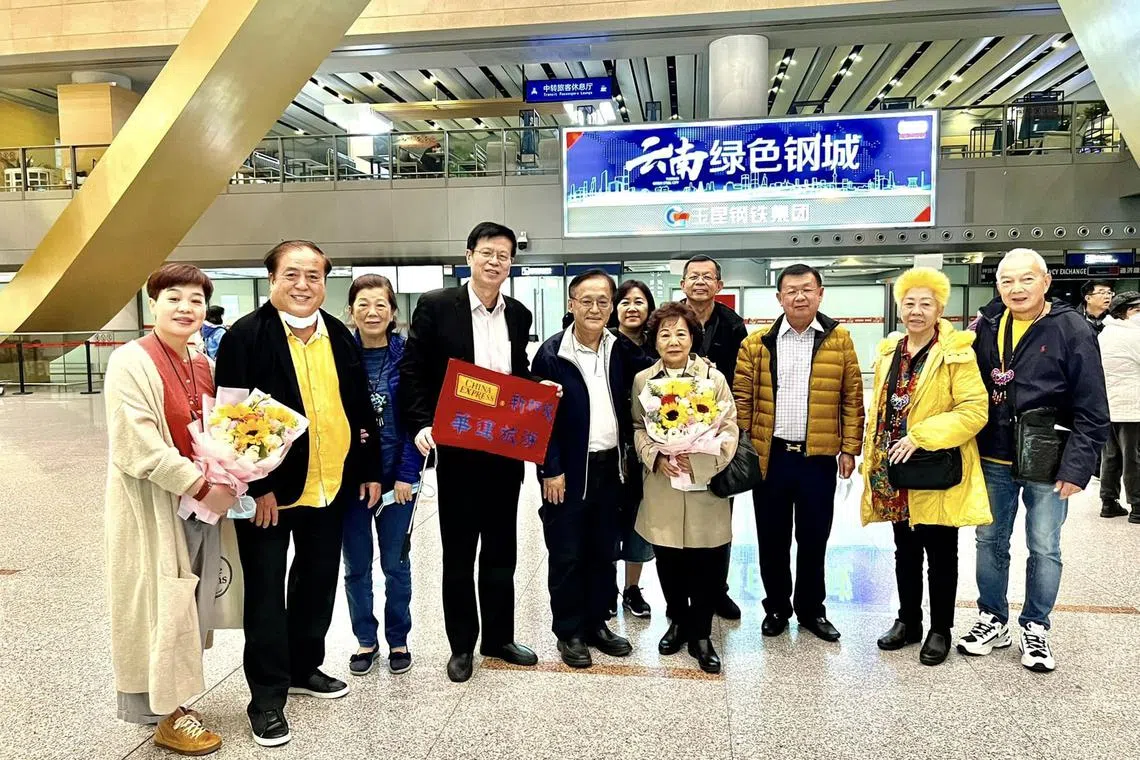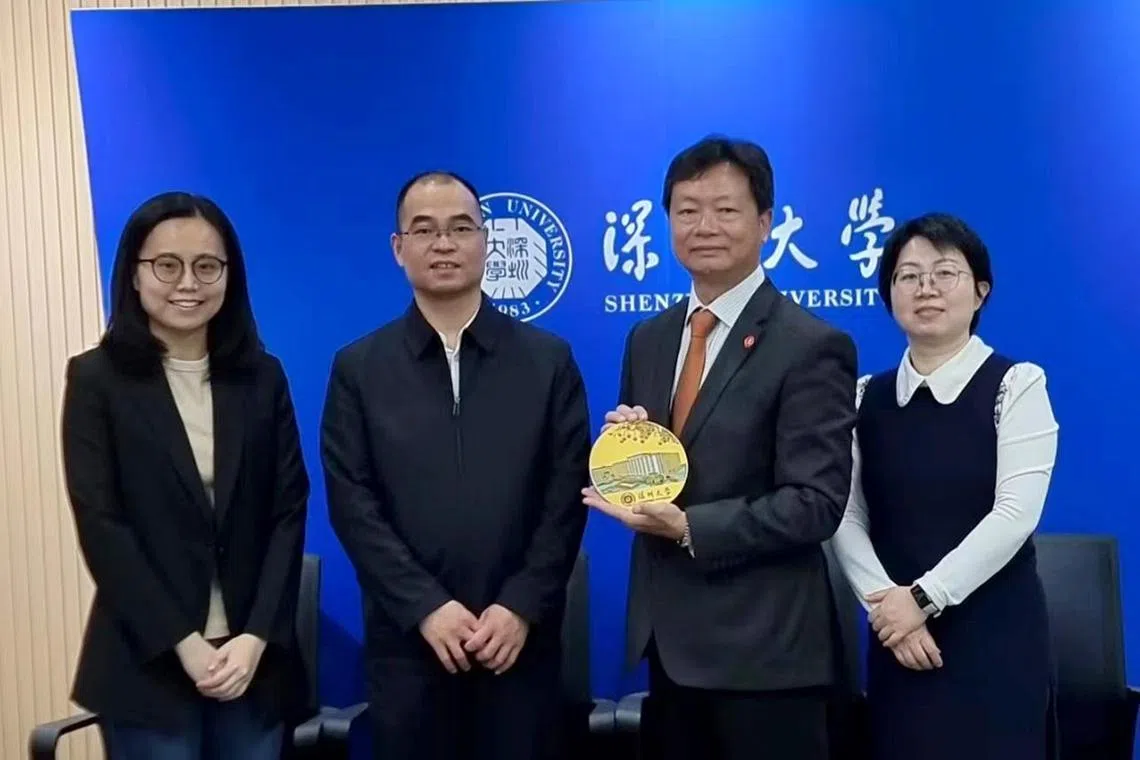As China reopens, ‘old friends’ from S’pore get a head start in resuming ties
Sign up now: Get insights on Asia's fast-moving developments

Former PAP MP Seng Han Thong (fifth from left) visited China from Feb 25 to March 3. China Express Travel founder Li Liang Yi (fourth from left) was also in the group.
PHOTO: SENG HAN THONG/FACEBOOK
Follow topic:
SINGAPORE/BEIJING – A month before China resumed issuing all visas to foreigners on March 15, Singaporean businessman Tony Du received an invitation to visit the country from the Sichuan provincial government’s overseas Chinese affairs office.
Mr Du, who is president of the Tian Fu Association, a Singapore clan association for new Chinese immigrants, gathered a group of 30 members for the five-day trip starting March 25.
The delegation comprised businessmen, such as veteran architect Liu Thai Ker, and also included students. They entered on business visas processed with the help of the Chinese embassy in Singapore. While they paid for their air tickets, all other expenses were borne by the Sichuan government.
To explore opportunities for collaboration, the group visited places such as the city of Mianyang, the districts of Wenjiang and Qingyang, and a development area called the Tianfu New Area. In Chengdu, they met officials from the Singapore consulate.
There were also discussions with Chinese officials, the highest-ranked of whom was Sichuan Provincial Standing Committee member Zhao Junming. Mr Zhao is also head of the Sichuan arm of the United Front Work Department, which maintains ties with the ethnic Chinese diaspora, especially individuals who play significant roles in their own communities.
Mr Du is among a small group of Singaporeans who were among the first to be invited to visit China again after it emerged from nearly three years of travel restrictions.
Mr Du and others who spoke to The Straits Times described a China that is striving to move forward from one of the world’s longest Covid-19 lockdowns.
Former People’s Action Party MP Seng Han Thong visited Yunnan and Guizhou provinces from Feb 25 to March 3 with 20 others.
The group made stops at locations such as Maotai town, where the fiery Kweichow Moutai liquor is produced, as well as Zunyi, a historically significant location in Communist Party history.
The visit made local news and was hailed by Guizhou state media as the “first tourist group from Singapore” to visit the region since the pandemic.
Mr Seng said of his visit: “There were much fewer people, but many shops were open and the desire to recover from the pandemic was there, although my impressions were superficial as I only visited briefly.”
The former politician said that the group travelled on business visas, which were approved with the help of the Chinese embassy. He was invited to join the trip as a regular customer of the organiser, China Express Travel, a Singapore-based agency specialising in tours to the north-western parts of China. Its founder Li Liang Yi was also part of the group.
When Mr Seng returned to Singapore, he participated in a Guizhou-Singapore Trade and Investment Cooperation Symposium, which he posted about on his social media account.
These early visits to China came ahead of its relaxation of visa processes.
While China began resuming accepting visa applications on March 15, it is typically a lengthy process. Due to the backlog of those wishing to visit, it may still require up to four weeks to simply secure an appointment to submit an application. A previous 15-day visa exemption policy between Singapore and China has yet to resume.
The first regular tourists from Singapore landed in China only in April.
But Mr Du and others are familiar faces with longstanding business ties to China, as well as leaders of clan and new immigrant associations at home. They returned to Singapore with several early deals in hand.
One of the deals secured by the Tian Fu group will see it host a delegation from Qingyang district, which will visit Singapore in May or June. It will also make introductions for the delegation, which is headed there to learn about the aerospace industry. A few other deals are in the works, added Mr Du, whose association’s 3,000 members are mostly immigrants from Sichuan.
“Mr Zhao expressed the Sichuan government’s appreciation to us for bringing so many entrepreneurs right after the pandemic on this trip to discuss whether there are projects for mutual collaboration,” said Mr Du, who emigrated from China to Singapore in 1992 and is now managing director of Asia-Link, which provides human resource services.
Another Singaporean businessman who returned home with business deals was Mr James Ow, executive chairman and chief executive of AnnAik, a steel products maker and engineering service provider, and the previous president of the Singapore-China Business Association.
His group of 24 association members visited Xi’an and Hebei on a week-long official business mission in February that included cultural tours such as to the well-known Terracotta Army collection in Xi’an.
It was a productive trip, he said, yielding concrete business ventures, especially in the green and digital fields.
Businessman Wang Quancheng has visited China almost every month since December when he also attended Xiamen’s Two Sessions parliamentary meetings. The president of the Hua Yuan Association in Singapore, which helps new Chinese immigrants integrate, used his Apec Business Travel Card that allows foreigners to engage in business activities there without a new visa.
He recently went on a three-week trip with a business associate “to understand the market better”, especially to see if any policies have changed since the pandemic.
“On the surface, they might seem open but some of the operational details might have changed, especially under a new leadership,” said Mr Wang.
Other visits took a more political tone. Mr Philip Chan, the managing director of a Singapore real estate investment firm, was invited to attend China’s Two Sessions
The Singaporean was one of 30 such representatives from around the world – including the United States, Thailand, Malaysia, Brunei, the Philippines and also Europe and Africa – invited by the Chinese People’s Political Consultative Conference (CPPCC).
They attended the opening and closing ceremonies, took part in a discussion, and were briefed by Chinese officials on issues such as when visa restrictions would be eased.
The visitors also met CPPCC secretary-general Wang Dongfeng, one of 23 vice-chairmen of the political advisory body.

Kowloon Club founder Philip Chan (second from right) visited China to attend the annual Two Sessions parliamentary meeting as a special foreign observer, and also made several other stops, including to Shenzhen University.
PHOTO: SHENZHEN UNIVERSITY COLLEGE OF INTERNATIONAL EXCHANGE
Mr Chan, a former Hong Konger and president of the Kowloon Club helping new immigrants to Singapore, said he discussed with the other participants how Chinese immigrants should behave in their host countries, as that could affect the way China is perceived.
“Don’t be self-righteous and always use the rhetoric that China is a big and powerful country to show your sense of superiority. The essence of Chinese culture is tolerance, humility and not doing to others what you don’t want done to you,” he said.
Observers said that given the current geopolitical climate with United States-China tensions dominating headlines, such connections are more important than ever as Beijing cultivates friends both old and new.
On May 8, some 500 representatives from 130 countries and regions including Singapore were in Beijing for the Conference for Friendship of Overseas Chinese Associations, where they met Chinese President Xi Jinping and fourth-ranked Politburo Standing Committee member Wang Huning.
For Mr Chan, who did not attend last week’s meeting, the trip to China was simply about “old friends” catching up again.
He said: “I was very happy I could see many old friends, to recall good memories and to talk about the future. For the past three years, the economy was affected and so were everyone’s businesses. And of course, now they have high hopes. From this step onwards, they will try to do their best to develop their businesses again.”
Correction note: An earlier version of the story said veteran architect Liu Thai Ker was retired. He still runs Morrow Architects and Planners. We are sorry for the error.

